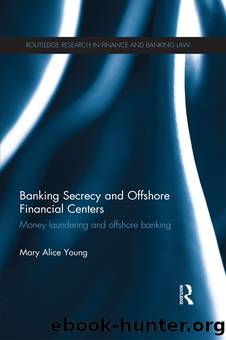Banking Secrecy and Offshore Financial Centers by Young Mary Alice;

Author:Young, Mary Alice;
Language: eng
Format: epub
ISBN: 1125183
Publisher: Taylor & Francis Group
However, what is a competent authority? One must assume that it is up to the discretion of the member country to decide the meaning of this term and its application, because it is left as ambiguous in the 19 Recommendations. However, it is taken for granted and morally right that the law enforcement authorities dedicated to anti-narcotics and anti-money laundering efforts are the most appropriate recipients of confiscated proceeds of crime in the Caribbean.
Regionality?
As has been argued above, one of the raison dâêtres for a regional implementation of the international standards is to allow for a response that takes into account the regional context within which the international standards are designed to operate. The discussion above shows that the 19 Recommendations and the Model Regulations are shaped regionally in their approach to confiscation, because of their response to the Caribbean drug problem. However, there is a lack of cohesiveness between the two regional agreements, and one of the reasons for this may be that the countries which they target are not very homogenous. The states within the Caribbean region often face very different problems and are economically and politically diverse. Furthermore, the 19 Recommendations actually reflect the 40 Recommendations of the Financial Action Task Force and therefore it may be seen that it is difficult to tailor the 19 Recommendations so specifically to the region, when they are heavily influenced by the global anti-money laundering standards.
Regional organizations including the Caribbean Financial Action Task Force and the Organization of American States advocate the use of confiscation as a method of deterrence against drug-related crime, but confiscation is only effective if those rules and regulations are correctly implemented by Member Statesâ law enforcement agencies. Pastor and Fletcher comment on the correct use of confiscation laws in the Caribbean as vital to the strength and security of a stable region when they state that, â[i]n addition the region needs stringent legislation providing heavy fines and long-term imprisonment for drug traffickers. Their property ought to be held when they are arrested and confiscated if they are found guiltyâ. 41
Certainly, it is well known that violent crime in the Caribbean is linked to money laundering and drug trafficking, with much of the violent crime blamed on deported, criminal, non-American nationals, who have been shipped back to the Caribbean, arguably introducing ânew skills and transnational networks into the region that contribute to drug trafficking, money laundering, kidnapping and immigrant smugglingâ. 42 However, the jurisdictions where violent crime is perceived as increasing are where the criminal organizations are situated and not where they launder their money. Violent, aggressive, crimes tend not to occur in the wealthy jurisdictions of the Anglophone jurisdictions such as the Caymans but in the economically struggling Jamaica, Puerto Rico, Guyana, Suriname, and Trinidad and Tobago. 43 Regional confiscation laws can work to appropriate the proceeds of crime in offshore financial centers, at the same time sending out a very clear message to organized crime groups who utilize the rest of the Caribbean as a playground: violent and organized crime is not acceptable.
Download
This site does not store any files on its server. We only index and link to content provided by other sites. Please contact the content providers to delete copyright contents if any and email us, we'll remove relevant links or contents immediately.
The Social Psychology of Inequality by Unknown(2311)
The Plant Paradox by Dr. Steven R. Gundry M.D(2040)
The Writing on the Wall by Anselm Jappe(1759)
Working for Yourself by J.D. (Nolo) Stephen Fishman(1478)
Every Landlord's Legal Guide by Janet Portman & Stewart Marcia & Ralph Warner(1325)
The First 20 Hours: How to Learn Anything ... Fast by Kaufman Josh(1304)
ADHD on Trial by Michael Gordon(1241)
Decisive by Chip Heath(1201)
Drafting Contracts: How and Why Lawyers Do What They Do, Second Edition by Stark Tina L(1171)
Working for Yourself by Stephen Fishman J.D. (Nolo)(1139)
The Economist Aug 8th 2015 by The Economist(1123)
Restitution by Restitution(1115)
The Economist Aug 29th 2015 by The Economist(1097)
A Practical Guide to International Arbitration in London by Hilary Heilbron(1084)
Intellectual Property Strategy by John Palfrey(1082)
The Lord of the Rings: The Fellowship of the Ring, the Two Towers, the Return of the King by J. R. R. Tolkien(1082)
Collusion by Luke Harding(1045)
Persuasion by Owner(1012)
Chapter 1 by Owner(950)
